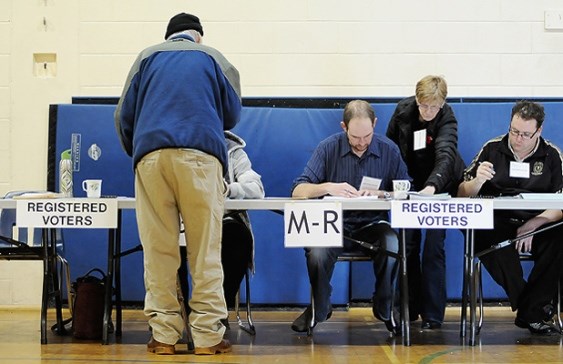With 84 per cent of eligible voters casting a ballot in its 2011 municipal election, Bowen Island sure knows how to get its vote on.
Langford, with an abysmal 14 per cent voter turnout, does not.
Vancouver?
Voters here at least beat the provincial average of 29.5 per cent for number of people who cast a ballot in the 2011 municipal elections in B.C.
A reasonable 35 per cent of the city’s 418,878 eligible voters had their say in 2011 as to whom they wanted on council, school board and park board. But according to Vancouver’s city clerk Janice MacKenzie, who doubles as chief election officer, it was another poor showing at the polls.
“That’s about a third of the eligible voting population that are selecting the decision makers, so no that’s not good enough,” MacKenzie told reporters at city hall Wednesday as she explained how the city plans to increase voter turnout for the Nov. 15 election.
What’s good enough?
“The higher, the better,” she said.
The city’s goal is to have a 60 per cent voter turnout by 2025 but will settle with a four to five per cent increase in this November’s election.
The 2011 election cost $2.1 million and the city will spend an additional $600,000 this year on a number of measures to get more people to the polls.That includes almost tripling the number of advanced voting days to eight, beginning Nov. 4 from 8 a.m. to 8 p.m.
For the first time ever, the city will allow voters to cast ballots in the Oakridge and International Village malls, the Vancouver Art Gallery and some post-secondary institutions.
The city will experiment with sip-and-puff technology for disabled voters, audio equipment for the hearing impaired and a magnification device to enlarge the ballot at the city’s 120 polling stations.
“We’re wanting to make voting as easy and as convenient as possible,” said MacKenzie, noting reasons for the lack of interest in previous civic elections could be rooted in people being busy, not familiar with the issues or believed their vote didn’t matter.
The candidates and campaign platforms also play a part in voter turnout as evidenced in 2002 when Larry Campbell and COPE won a huge majority.
Fifty per cent of eligible voters cast a ballot in 2002, which featured a race fought mainly over the city’s drug problem and the need for a supervised drug injection site.
In Bowen Island’s case, mayor Jack Adelaar said a movement to turn the island into a national park and the proposed development of Cape Roger Curtis attracted voters in 2011.
That said, Adelaar noted the island has a population of engaged residents and has historically had strong voter turnouts.
“We’re quite proud of that,” said Adelaar, noting the community does nothing special to get more people to the polls.
MacKenzie said studies have shown young people and multicultural communities are less inclined to register to vote.
The city’s election staff will recruit high school and post secondary students to work in the election. Staff will also reach out to various ethnic communities to provide information about the election.
Mary Clare Zak, the city’s social policy director, said voter turnout is often a barometer to how engaged residents are in a city.
Increasing the city’s connection with people and their communities is a key goal of Vancouver’s healthy city strategy, Zak said.
She emphasized the need for parents to switch on their children to what it means to vote and why it is important.
“The more that we talk to children and young people about these things, the more they’ll be able to relate that to what that means to go and vote at the polls,” Zak said.
MacKenzie reminded residents that local politicians make decisions on services that affect people’s daily lives, including garbage pick-up, clean drinking water, roads and sidewalk repairs, libraries, fire and police services, street lights and ice rinks.
On Nov. 15, voters will elect one mayor, 10 city councillors, seven park board commissioners and nine school board trustees for four-year terms.
Voters will also cast ballots on capital plan borrowing questions to fund major projects such as building and transportation infrastructure, public safety projects and parks.



